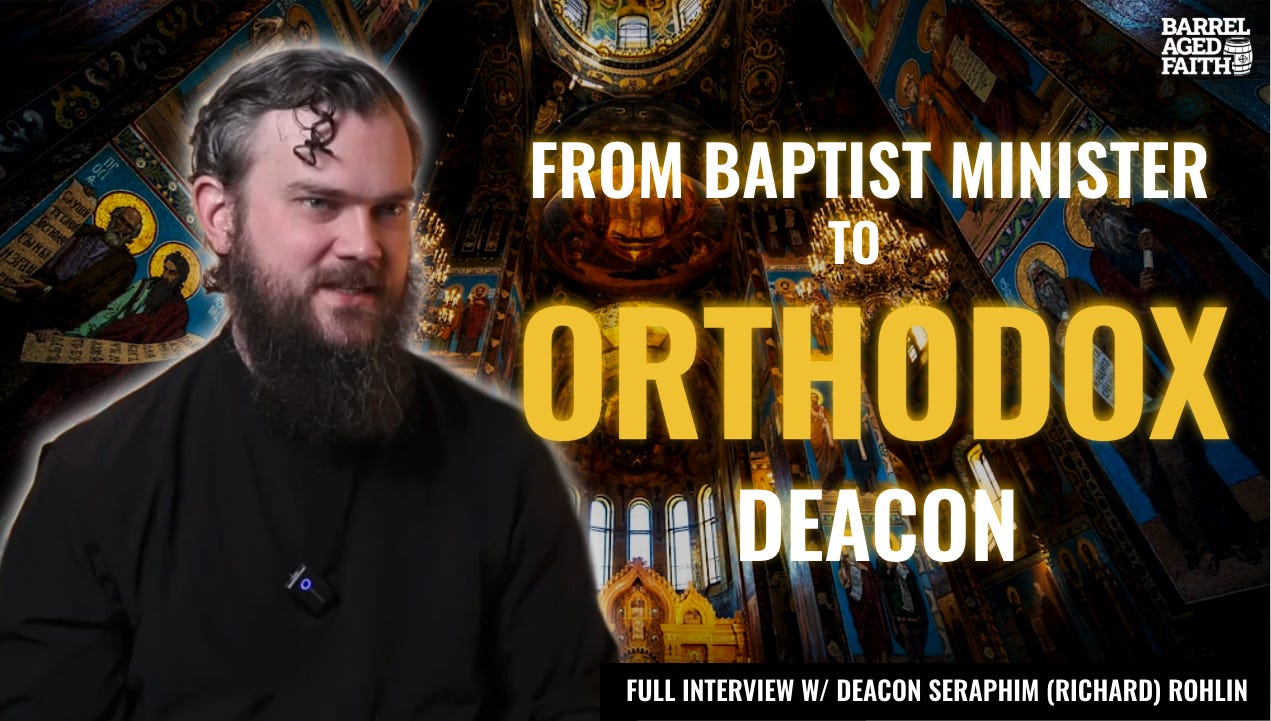The Curious Case of Deacon Seraphim Richard Rohlin
Full Interview w/ Orthodox Deacon & Podcaster (Amon Sul, The Great Tales, Universal History, etc.)
Deacon Seraphim (Richard) Rohlin is probably one of the most interesting people I have ever met. I first heard of him because of his work on J.R.R. Tolkien from an Orthodox perspective years ago but later came to realize that he brings profound insights to almost any topic he discusses (Orthodox catechesis to medieval church history to ancient tales and myths).
I also really enjoyed his talk that he gave at the recent Touchstone conference in Chicago where many Orthodox speakers presented (Rod Dreher, Paul Kingsnorth, Jonathan Pageau, and Deacon Seraphim). He spoke of the importance of the dining room table in the home and how feasting as a family can renew civilization in the midst of ruins. Feasting is more than eating together. It involves inviting guests (friends and strangers i.e. ‘feasting the poor’), preparing recipes that match the liturgical calendar (i.e. a roasted goose w/ the last of the blackberries for Michaelmas), saying the prayers of the church, story telling, poetry, laughter, and likely for him, some pipe smoking on the front porch.
While at the conference, I also sensed that Deacon Seraphim serves as kind of a bridge between talks given by Rod Dreher and Paul Kingsnorth. Anyone who follows Kingsnorth knows that he is a prophet against the Machine and AI and that he emphasizes a kind of wild Christianity. I love many of his essays as well as his series on holy wells and Irish/English saints. Rod Dreher can also sound a bit like Kingsnorth in his ‘Benedict Option’ and yet he is also willing to enter into the culture wars with a battle cry and state his opinions on ways to save or renew Christian civilization (Christendom in the broad sense of the word). The tension between these two talks is the same kind of tension we see in church history between the monk’s cave and the bishop’s cathedral.
As I pondered these two dynamic talks, I stumbled upon an essay that Deacon Seraphim Rohlin wrote a few years back that seems to provide a resolution. He writes,
“This is the strange, most basic paradox of the Gospel which Our Lord models for us when he humbles Himself, and makes Himself of no reputation, and becomes obedient unto death—even the death of the Cross. And yet it is on the basis of this that all the beauty of Christendom has been built. Within that great “cathedral” there is room and enough for “food and song,” just as there is room for romantic love, but these things were built on the bones of the martyrs... Scruton says that our idea of the sacred is at the heart of our idea of home. Architecture, I would argue, follows asceticism, and if we are going to create a sense of oikophilia which is worth passing down to our children, it must begin with self-denial. The monk leaves the world for the sake of the world; the Christian fasts for the sake of his body; the Shire is saved, but not for Frodo.” Source: Saving the Shire: Ascetic Renunciation and Love of Home
It was from the caves and catacombs (fasting, praying, studying, solitude with God) that true Christian civilization was born. This led to the formation of the world’s first hospital campus (The Basileiad, built by St. Basil in 4th century), the first Christian university (Pandidakterion, 5th century), as well as the world’s largest cathedral for 1,000 years (Hagia Sophia in 6th century). And let’s not forget that it led to the liturgical services of Holy Week, which Deacon Seraphim considers the pinnacle of all literature and poetry in history!
Of course, Kingsnorth reminds us that rugged discipleship (“pick your cross and follow Me”) at the end of the empire must always take precedence over maintaining our beloved institutions of Christian civilization and that there is real risk of apostasy if we try to hold onto power through worldly means. At the same time, Dreher reminds us that we cannot go into complete hiding (the caves) while there "is still some good in this world (or the West) worth fighting for.” (-Samwise). Perhaps, the best way to unite the cave (Kingsnorth) with the cathedral (Dreher) is through the ordinary, dining room tables of our homes where the many halflings gather around the father as he tells the stories of ancient dragons and brave saints over a very merry feast.
You may find Deacon Seraphim (Richard) Rohlin’s full interview below as well as links to his 3 popular podcasts.
Universal History (co-host, Jonathan Pageau)
The Great Tales w/ Ancient Faith (co-host, Fr. Andrew Stephen Damick)
Amon Sul (Lord of the Rings/Tolkien) (co-host, Fr. Andrew Stephen Damick)



“The Shire is saved, but not for Frodo.”
I love Orthodox Deacon Joshua Jackson 😁